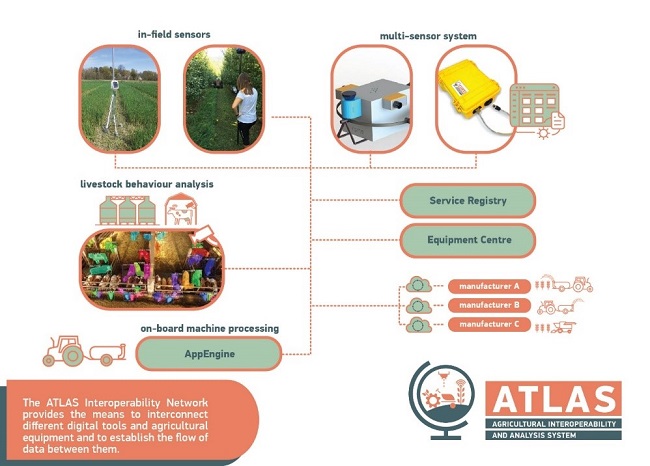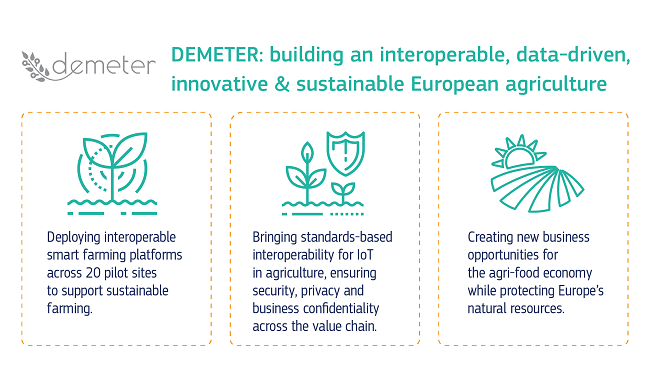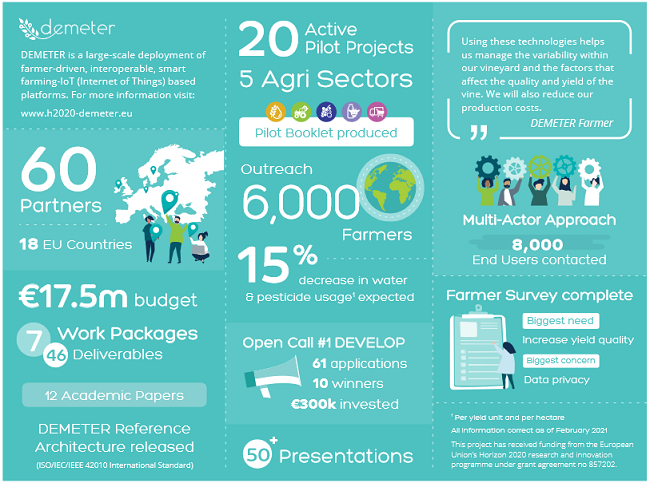Through Horizon 2020, more than €200 million for Research and Innovation (R&I) were allocated to the deployment of digital technologies for the agricultural sector.
Euronews
FUTURIS. Precision Farming - targeting resources to save on cost and benefit animal welfare
These funds were aimed at advancing the development and deployment of digital technologies that can enable precision farming, sustainable agriculture, and more efficient food production. The specific activities supported under Horizon 2020 included the development of smart farming systems, digital solutions for precision agriculture, and the integration of digital technologies into the entire agricultural value chain. These initiatives are expected to help European farmers increase their competitiveness, reduce their environmental impact, and improve their overall productivity.
Horizon 2020 has been a key driver in funding digital innovation for the agricultural sector, with over €200 million allocated towards Research and Innovation (R&I) activities. Two prime examples of this investment can be seen in the areas of robotics and IoT/digital platforms.
In robotics, more than €75 million was invested to support the development of one Robotics Digital Innovation Hub (DIH), three large-scale pilots, and additional R&I projects. Agriculture is one of four priority areas for the robotics programme within Horizon 2020, which is the world's largest civil funding programme for robotics.
In the area of IoT and digital platforms, nearly €80 million was invested to support the deployment of these technologies in agriculture. Three pilots and a network of DIHs were the recipients of this funding, which were used to research and develop digital technologies for use in farming. These initiatives include IoF2020, DEMETER, ATLAS, and SmartAgriHubs.
IoF2020
The project aimed to accelerate the adoption of IoT technology in the farming and food industry to improve food safety, increase productivity, and strengthen competitiveness in Europe. It included 19 use cases in 5 trials with a lean multi-actor approach and will develop an open IoT architecture and infrastructure of reusable components based on existing standards, as well as a security and privacy framework.
| IoF2020 Facts |
| Timeline: 01.01.2017 – 31.03.2021 |
| Total cost: € 34 089 926,50 |
| Website, Use cases, Factsheet |
Atlas
The project aims to address the lack of data interoperability in agriculture by creating an open platform that provides hardware and software interoperability using data from sensors. It will demonstrate the benefits of digital agriculture through 13 pilot studies and establish an ecosystem for innovative data-driven agriculture by creating a network of end-users, service providers, researchers, and policy makers along the agricultural value chain.
| ATLAS Facts |
| Timeline: 01.10.2019 – 31.03.2023 |
| Total cost: € 15 605 170 |
| Website, Pilot studies, Factsheet |

Demeter
The project aims to deploy farmer-centric interoperable smart farming-IoT based platforms through 20 pilots across 18 countries, involving 60 partners, 25 deployment sites, and 6,000 farmers. It will optimise the data analysis obtained across multiple farms and provide an open and interoperable data integration model. It also aims to support sustainable farming and food production systems, provide safe food, and bring new business opportunities to the farm and wider agri-food economy.
|
DEMETER Facts |
|
Timeline: 01.09.2019 – 31.08.2023 |
|
Total cost: € 17 559 006,22 |
| Website, Pilot Studies, Factsheet |


SmartAgriHubs
The project aimed to accelerate the digital transformation of the European agri-food sector by building a network of Digital Innovation Hubs (DIHs) that would boost the uptake of digital solutions by the farming sector. It included 28 flagship innovation experiments demonstrating digital innovations in agriculture and will improve the maturity of innovation services of DIHs so that digital innovations would be replicated across Europe and widely adopted by European farmers. It worked in lockstep with European regions to maximise the return of European investments, including regional structural funds and private capital.
|
SmartAgriHubs Facts |
|
Timeline: 01.11.2018 – 30.11.2022 |
|
Total cost: € 22 400 850,78 |
| Website, Innovation Experiments, Factsheet |
AI precision farming and Robotics
agRoBofood
The agRoBofood project aims to accelerate the digital transformation of the European agri-food sector through the adoption of robotic technologies. Its main objective is to establish a sustainable network of Digital Innovation Hubs that will boost the uptake of robotic solutions by the agri-food sector, with the goal of maximising the return on European investments and transforming the sector.
|
agRoBoFood Facts |
|
Timeline: 01.06.2019 – 31.05.2023 |
|
Total cost: € 16 658 044,74 |
| Website, Innovation Demonstrators, Factsheet |
Romi
The Romi project aimed to develop an open and lightweight robotics platform for microfarms to reduce manual labour, increase productivity, and monitor crop development. Its main objective was to develop an affordable, multi-purpose, land-based robot that is adapted for organic microfarms and to integrate advanced 3D plant analysis and modelling techniques to improve sensorimotor control of the plant monitoring app.
|
Romi Facts |
|
Timeline: 01.11.2017 – 31.07.2022 |
|
Total cost: € 3 868 186,25 |
| Website, Tools, Factsheet |
Pantheon
The Pantheon project aims to develop a new way to monitor plant health to detect plant physiology and make corrective interventions. Its main objective is to establish approaches with unprecedented precision and sensitivity for constant monitoring of plant health, focusing on Brassicaceae and Grapevine, which are important annual and perennial species for the EU economy, with the goal of reducing yield losses and facilitating effective management practices.
|
Pantheon Facts |
|
Timeline: 01.11.2019 – 31.10.2024 |
|
Total cost: € 1 117 800 |
| Website, Factsheet |
Related Content
Big Picture
The digitalisation of agriculture in Europe holds significant potential to enhance efficiency, effectiveness, sustainability, and competitiveness across the sector.
See Also
The future of farming relies on research, innovation and capacity building in the agri-food sector funded through multi-financial framework initiatives.
